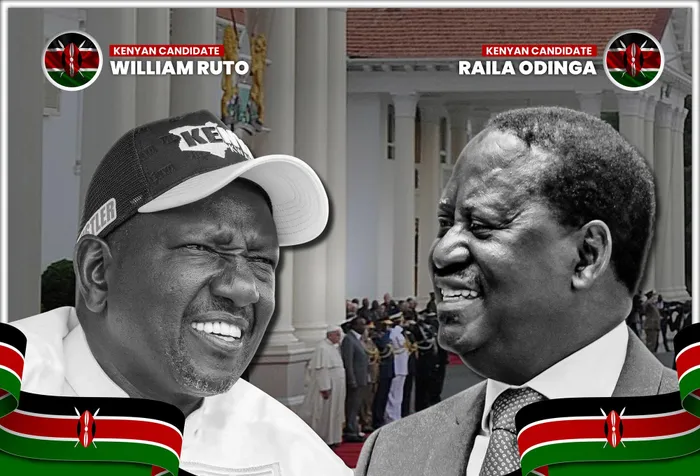Odinga and Ruto: A battle of political titans in Kenya

Graphic: Timothy Alexander - William Ruto, 55, and Raila Molo Odinga, 77, the two major contenders, are in a tight race to succeed President Uhuru Kenyatta, who is completing his second term in office, says the writer.
By Dr Omololu Fagbadebo
The August 9, 2022, election in Kenya was characterised by different twists. And the fear of a repeat of the deadly post-election violence that usually follows an election in the country seems to have been dwarfed by the undertaking of the major contenders for the presidency to accept the outcome of the election.
At the last count, Raila Molo Odinga, 77, and William Ruto, 55, the two major contenders, are in a tight race to succeed President Uhuru Kenyatta, who is completing his second term in office.
Odinga, a former prime minister, is contesting for the fifth time, while Ruto, the deputy president, is taking a shot at the highest political position for the first time. To be declared a winner, a candidate must garner more than 50% of the total votes with a minimum of 25% votes cast in at least 24 of the 47 counties.
Unlike the 2007 and 2017 elections where the contenders, Uhuru Kenyatta and Odinga, were from the two established political dynasties, the 2022 election parades Ruto, a new entrant into the Kenyan political turf.
Odinga is a veteran of the presidential contest, having thrown his hat into the political ring five consecutive times. In a major twist, Kenyatta has supported his political rival, Odinga, against his deputy, Ruto.
A political rapprochement among the political elites in 2018, coupled with a fallout between Kenyatta and Ruto, after their election in 2017, gave rise to a shifting political alliance in Kenya where the incumbent supported the opposition against the candidate of his political party. This is a major factor that has given rise to the close call of the race.
The election race is driven more by class than ethnic sentiments. Kenyatta and Odinga belong to less than 1% of Kenyans who own more than 90% of the country’s wealth. Kenya is going through a tough economic environment with soaring prices of commodities. Ruto’s campaign promises centred around economic reforms.
With his bottom-up economic model, Ruto promised to empower low-income communities, a position that seems to challenge the economic dominance of the Kikuyu ethnic group of Kenyatta. Odinga is regarded as a more conservative candidate, even though his welfare programme promises to appeal to the downtrodden citizens.
The political divide occasioned by Kenyatta’s decision has lessened the propensity of bloc votes of the Kikuyu, the largest ethnic group in Kenya. Both Odinga and Ruto picked their running mates from the Kikuyu tribe. This political calculation is designed to neutralise the dominance of any of the major contenders. Kenyatta’s support of Odinga aimed, in part, to ensure the return of another Kikuyu elite in power after the expiration of Odinga’s tenure.
Martha Karua, a lawyer and former minister of justice, is Odinga’s running mate. However, Ruto’s choice of Rigathi Gachagua, a fierce critic of Kenyatta, as his running mate, was a ploy to whittle down the influence of Kenyatta in Kikuyu. This seems to have paid off. The results so far have shown that the votes in Kikuyu are evenly distributed between Odinga and Ruto. Kenyatta seems to have lost the bloc support of his ethnic base. And his political party is rooting for the victory of its candidate, Ruto.
The turn of events in the Kenyan election is going to impact the country’s political development profoundly, depending on the outcome.
The prospect of post-election violence seems to be lesser because the major contenders are present in Kikuyu. The rapprochement between Odinga and Kenyatta after the 2018 handshake and the active support offered by the president for his former political foe will probably pitch the few wealthy political elites against the upcoming middle class represented by Ruto.
This will probably redefine Kenya's political and economic environment, should Ruto win the election. If Ruto loses, it will mark the beginning of a revolution or movement for a more liberalised economic system that will appeal to the majority of Kenyans.
Odinga’s victory will give Kenyatta another lease on political life and become a godfather to Karua, in preparation for her succession to the throne after Odinga. But it will divide the Kikuyu ethnic group and probably give Kenya a new face of political support in subsequent elections.
Given the rivalry between Kenyatta and Ruto, a billionaire chicken hustler, and his running mate, another political foe of Kenyatta, and the disposition of the ruling party, the politics of Kenya's post-2022 election will lead to shifting alliances and loyalties among the political elites and citizens.
Should there be no outright winner and a call for a rerun, Kenya will probably witness another battle of political titans competing for the soul of a divided country.
Fagbadebo is a Research Associate at the Durban University of Technology.
This article is original to the The African. To republish, see terms and conditions.
Related Topics: